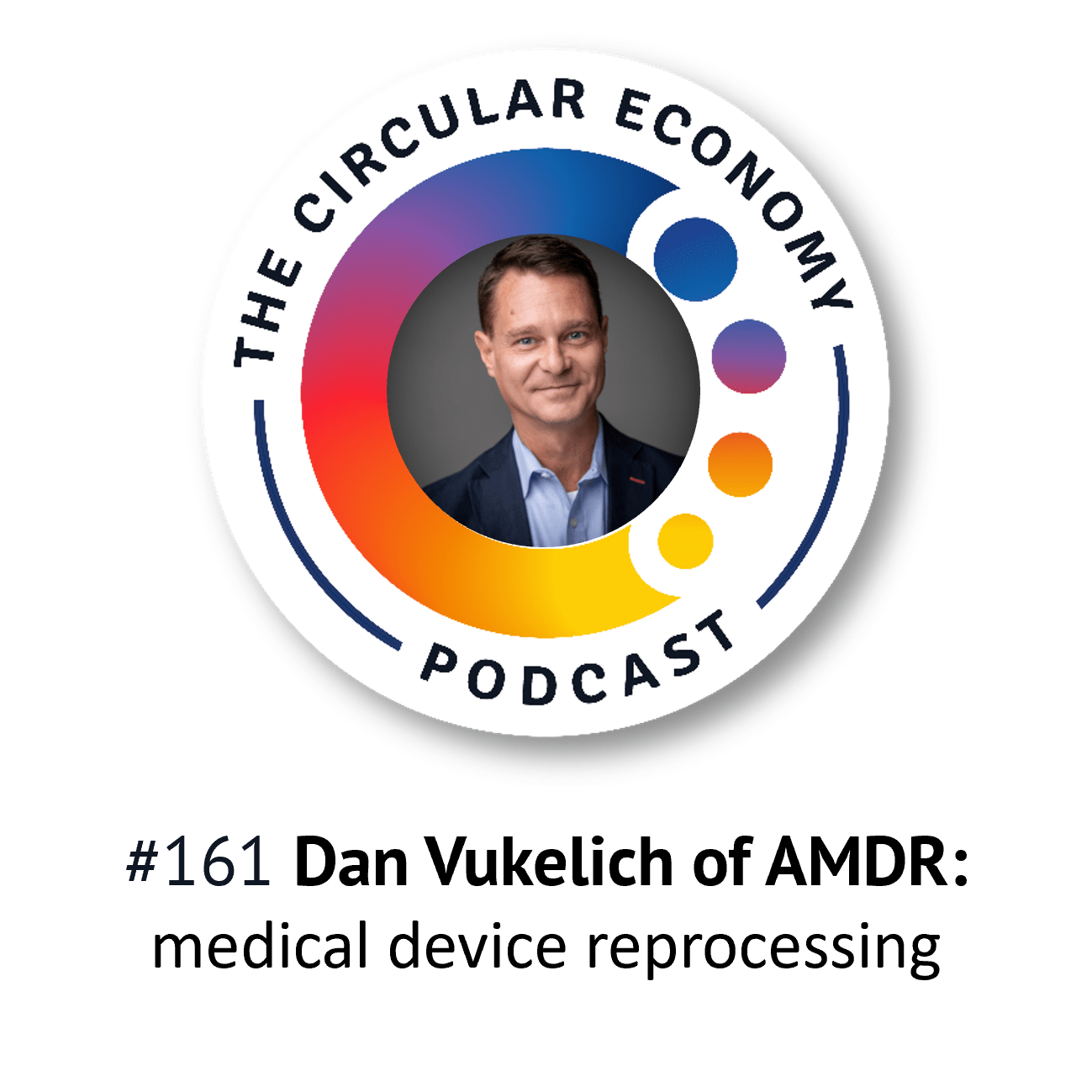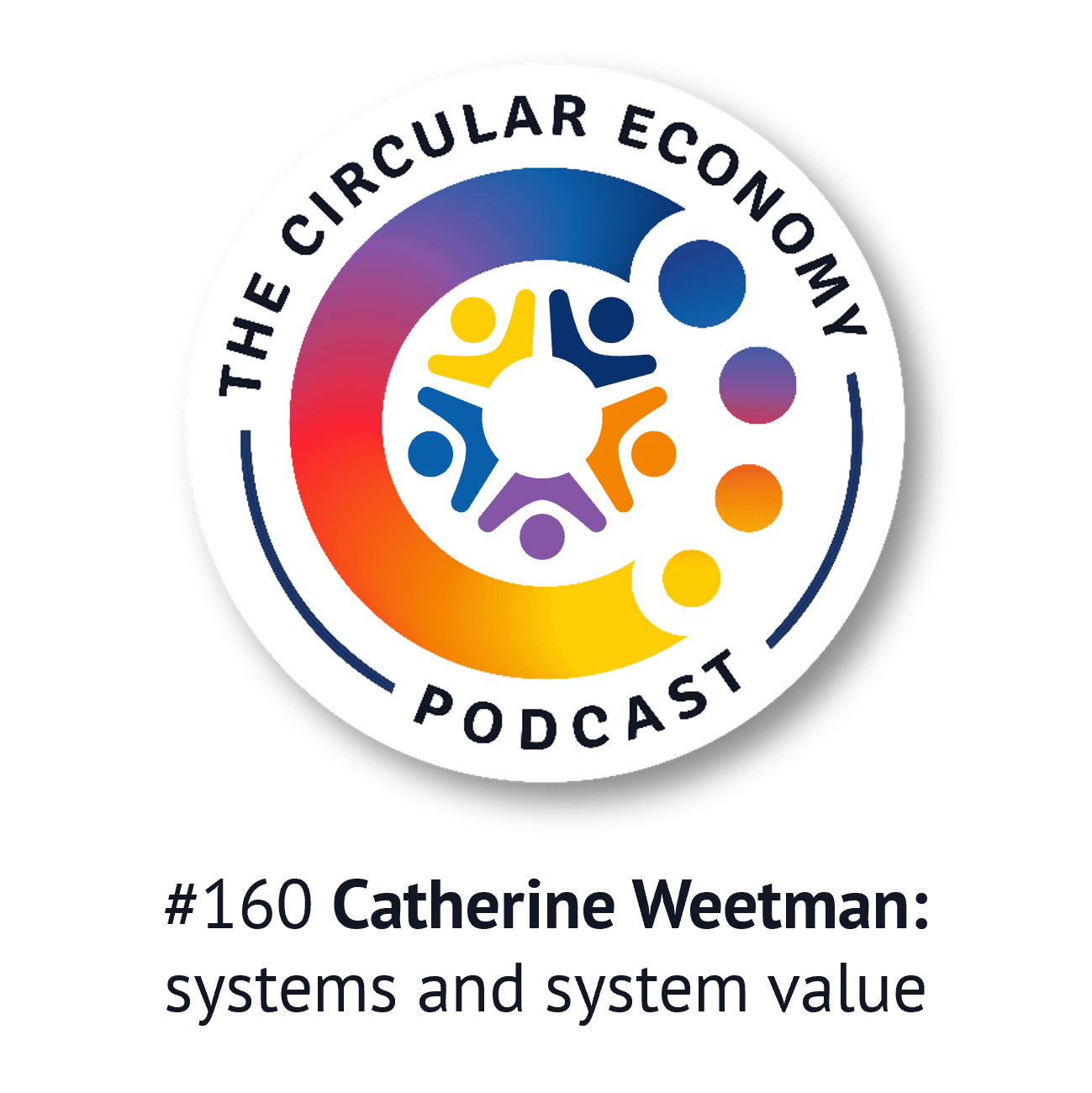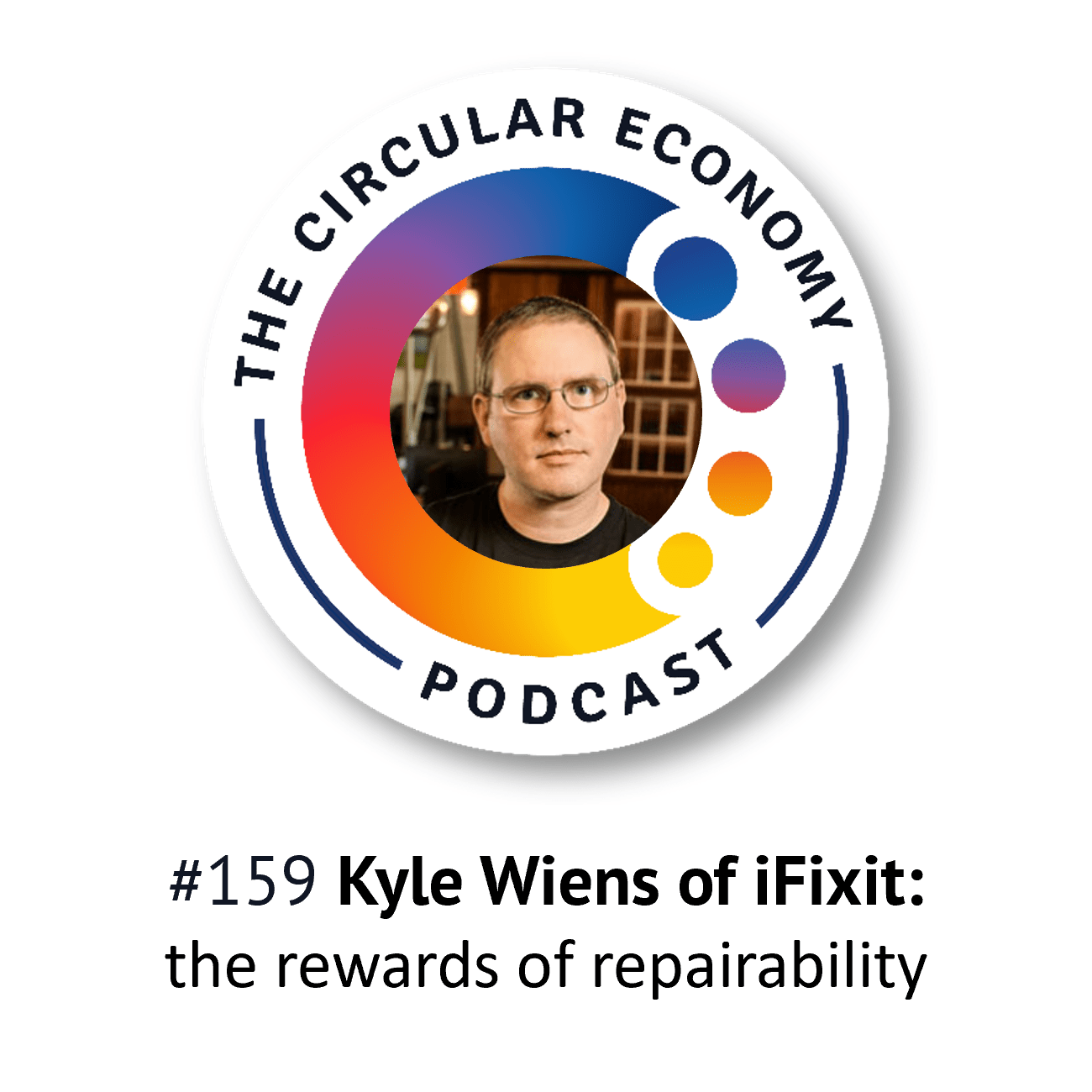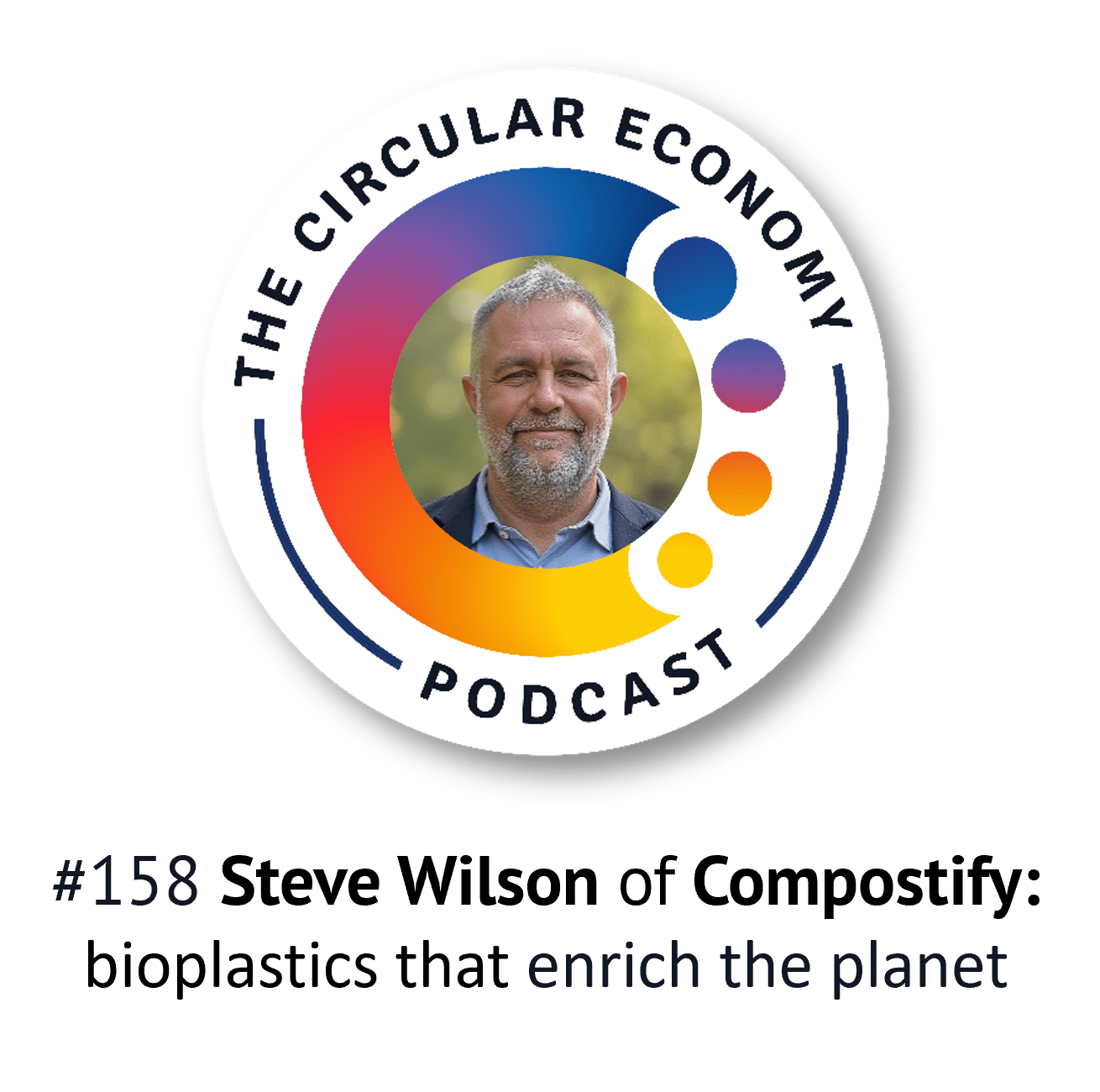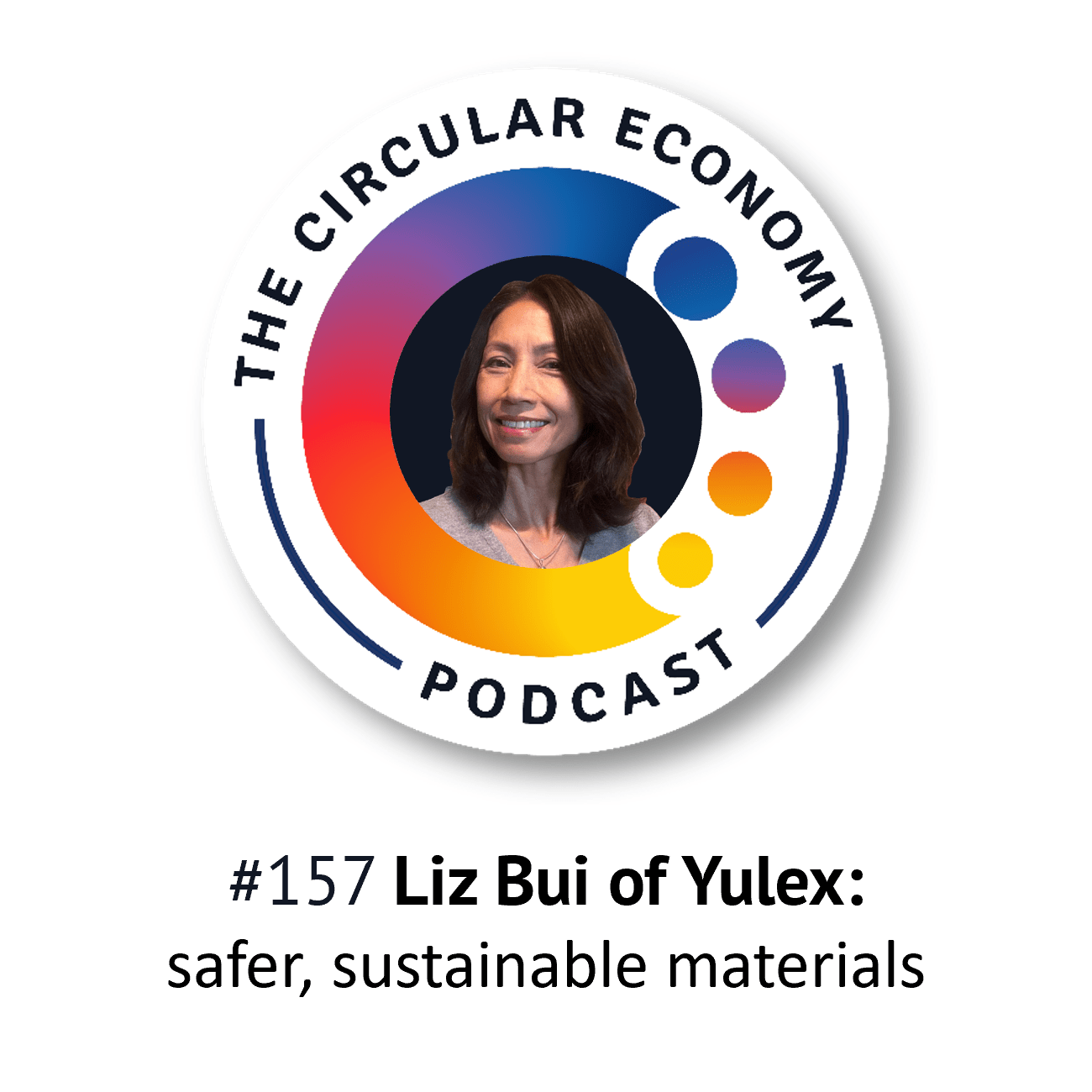Podcast: Play in new window | Download
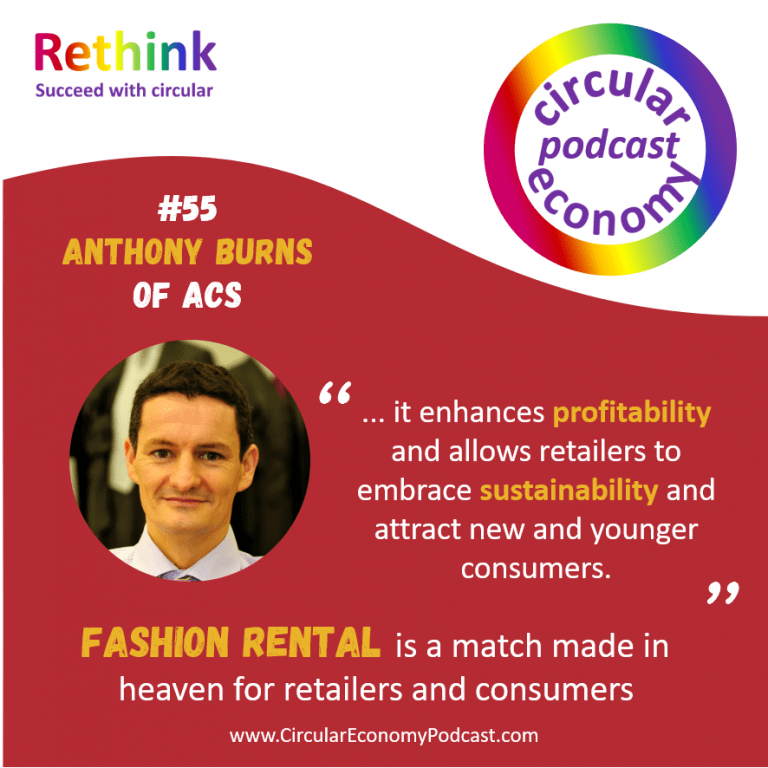
Catherine Weetman talks to Anthony Burns, Chief Operating Officer of ACS in Scotland. ACS started out as a formal-wear hire business, and is now an internationally recognised and award-winning circular fashion enterprise with clothes rental offerings for woman, men, children and babies. It is now working with a wide range of fashion brands, acting as their Circular Service Provider.
We find out how the business has evolved, its progress towards B- Corp status, and about some of its innovations in packaging and garment cleaning.
Anthony explains how he has focused the business on a social responsibility agenda, by becoming an accredited Living Wage provider, being a disability-confident employer, signing the ‘race at work’ charter and being a ‘good neighbour’ in the local community.
Podcast host Catherine Weetman is a circular economy business advisor, workshop facilitator, speaker and writer. Her award-winning book: A Circular Economy Handbook: How to Build a More Resilient, Competitive and Sustainable Business includes lots of practical examples and tips on getting started. Catherine founded Rethink Global in 2013, to help businesses use circular, sustainable approaches to build a better business (and a better world).
Stay in touch for free insights and updates…
Read on for a summary of the podcast and links to the people, organisations and other resources we mention.
You can subscribe to the podcast series on iTunes, Google Podcasts, PlayerFM, Spotify, TuneIn, or search for “circular economy” in your favourite podcast app. Stay in touch to get free insights and updates, direct to your inbox…
Don’t forget, you can use our interactive, searchable podcast index to find episodes by sector, by region or by circular strategy. Plus, there is now a regular Circular Economy Podcast newsletter, so you get the latest episode show notes, links and transcript delivered to your inbox on Sunday morning, each fortnight. The newsletter includes a link to the episode page on our website, with an audio player. You can subscribe by clicking this link to update your preferences.
Links we mention in the episode:
- https://www.linkedin.com/in/anthony-burns-7a017215/
- https://www.acsclothing.co.uk/
- https://www.linkedin.com/company/acs-clothing-limited/
- https://twitter.com/ACSClothingLtd
- Recommended Guest – Isabella West, Founder and CEO of HireStreet Limited hirestreetuk.com and https://www.linkedin.com/in/isabella-west-6a063754/ and Christine Hunsicker of Caastle https://www.linkedin.com/in/christinehunsicker/ and https://www.caastle.com/
About Anthony Burns
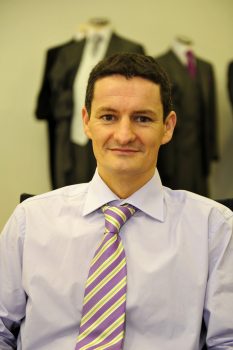
Anthony Burns is the COO of ACS, an internationally recognised business, which empowers fashion retailers and brands to strategically embed, and easily embrace, circular business models. In his role, he sets the strategic priorities of the business and leads the company in growing all areas, including marketing, technology, product and analytics. In 3 short years, Burns’ vision of creating a new economy for apparel is in full swing.
Under Burns’ leadership, ACS has been transformed into a circular fashion enterprise with clothes rental offerings for woman, men, children and babies. The company has already achieved zero waste to landfill and is making huge steps towards net zero emissions.
Anthony has expanded the company’s expertise into garment refurbishment, transforming clothes normally deemed unusable by retailers, into clothes as good as new, which can be resold, and their lifespan significantly increased.
He is an Engineering Graduate with a Masters in Logistics and also an MBA from Strathclyde University. He has established links with most of the leading Universities in Scotland delivering innovation in garment sanitisation, increasing worker activity in the workplace and embracing technologies such as 3d factory simulations. Anthony is a regular lecturer at universities and business schools nationwide. He is currently working with New College Lanarkshire to establish a Sustainable Fashion capability in Lanarkshire.
Under his leadership, ACS has received recognition as nominees and winners of renowned sustainability awards – including Vibes and Drapers.
Burns has focused the business on a social responsibility agenda, by becoming an accredited Living Wage provider, being a disability confident employer and signing the race at work charter. ACS has also been awarded for its employee health and well-being initiatives and is currently working towards B- Corp status.
Anthony Burns’ mission is to improve the sustainability of the fashion industry, and be more socially accountable, while increasing ACS’s turnover by 10-fold within 5-years.
Interview Transcript
Provided by AI
Catherine Weetman
Anthony Burns is the Chief Operating Officer of ACS, an internationally recognised business which empowers fashion retailers and brands to embed circular business models. Three years ago, Anthony set out a vision for creating a new economy for apparel, and has transformed ACS into a circular fashion enterprise with close rental offerings for adults, children and babies. ACS is currently working towards B Corp status and Anthony’s focus of business on the social responsibility agenda by becoming an accredited living wage provider, being a disability confident employer and signing the race at work charter. Anthony, welcome to the circular economy podcast.
Anthony Burns
Hi, Catherine. I’m delighted to be here. Thank you.
Catherine Weetman
Yeah, it’s great to see you at last. And yeah, there’s just so much to talk about. I’m already wondering how we’re going to fit all the questions I want to ask you into one episode. First, though, I’m curious to understand a bit about the history of ACS and how it evolved.
Anthony Burns
Well, as I said, excited to be on to tell you a little bit about ACS and what we are doing, and how we’re planning to make a difference how we are trying to make the fashion industry more sustainable, and how we are actually trying to do our bit to save the planet. I know it sounds a bit cheesy, but we are trying to facilitate change. So we are Europe’s largest rental and reseal fashion fulfilment centre. We’ve been established for about 25 years. And the backbone of our business for many years has been rental of men’s formalwear. So we’ve offered our white label service to multiple and independent retailers. For tuxedos & morning wear in Scotland, some Highland wear kilts. And we also offer a 3PL service to that same product. About 80% of outfits for men’s formal wear, which are rented for black tie events and weddings come from our facility, which is just outside Glasgow, between Glasgow and Edinburgh slightly west of centre. So in addition to men’s formal wear, we also offer a 3PL service to ladies dress rental companies, including the UK’s largest. And we offer the same 3PL service to baby clothing rental companies to facilitate re commerce and resale schemes for retailers. So all our business teams are inherently sustainable. But they also allow our retail partners to be more profitable, and to easily embrace sustainability and embed circular practice within money and business models.
Catherine Weetman
So just to explain to people who aren’t familiar with that acronym that was very familiar from my my career background, so 3PL being third party logistics service. So in other words, you’re providing all the logistics support for retailers and brands, and maybe just to explain recommerce as well. So that’s when there are returns from e commerce, which we know as grown massively during the pandemic ecommerce for fashion. So when people have ordered several sizes and sent one back or you know, have perhaps more cheekily worn it and then send it back. It has to come back. And ideally, you’re trying to get it back into the system and back on sale, if it’s suitable for that as quickly as possible. And I think particularly interesting is the expansion in in fashion rental recently. I know, as you explained, it goes back the history of that goes back a long way in terms of formal wear, but now rentals being embraced by all sorts of different companies. We’ve already talked to Bundlee and Onloan on the podcast that you know, baby wear and then more kind of high end high end women’s wear. So that you know companies are getting really interested in it.
Anthony Burns
And it’s sustainability that has facilitated change for us. In three short years, we went from focusing on maybe saw some continuous improvement in terms of lean, lean processes, cutting down on waste. That was when it started. And three years later, we’ve been asked to join the Ellen MacArthur Foundation, we’re working towards becoming a B Corp with one environmental Business Awards. We’re speaking to the UN, about how to make the fashion industry more sustainable. Using cop 26, as a vehicle to facilitate change. So some really big bits of progress. And to go back to your question, you know, the rental markets changing very much in the UK from traditional men’s formal wear. To be more like the US and Asia and Asians companies like white closet, are renting clothing via subscription service in the US. There’s companies like Rent the Runway, and Castle facilitate rental for big retailers like granny beyond Taylor loft vents, Rebecca Taylor, scotch and soda, scotch and soda, Banana Republic. So why is UK behind the US? Well, we understand that in the UK, there’s a culture of ownership compared to usership. Why is that? We believe it’s because it’s predicated on the fact that UK consumers own their own homes. So it creates this culture of, of ownership. But it’s changing as well because we’re all comfortable with release music, you know, release cars. We lease other people’s beds recently for Nortel rooms. And we don’t think anything of it, but we maybe have a reluctance to vent clothing. So a couple other reasons is a lack of awareness in the UK about clothing rental, but it’s changing and across the globe. There’s also a perception that clothing rental is Dotty compared to retail and it’s absolutely not the case and we’ve got the evidence and the processes to back this up. And we’re trying to influence all those to explain to them how clean and sanitised Clothing rental is relative to retail, but just as a stand alone. So we are trying to, you know, facilitate change on instance.
Catherine Weetman
That’s interesting, particularly about the culture of ownership. So in practical terms, and if you were explaining to somebody how the rental system works, and how you ensure that the clothes that they’re going to rent, in great condition nice and clean, and so on, talk us through the practicalities of that what happens to something when it comes back from rental and come through your door.
Anthony Burns
So when the garments come back initially, it’s really important as a starting point, particularly when you’re managing other people’s clothing as a third party logistics operation, that you have control over this, and you can provide good manners and information to them about their inventory. So we put RFID tags, long range RFID tags, which are laundry proof. And that’s the starting point so we can scan them, and immediately they are returned to inventory, because data management is really important with rental after that they are sorted depending on the type of garment. We also use before we actually start to clean items. We we’ve used innovative technologies when I see and, you know, ozone technology has been about for many years, we have been using it for a bit years, and we’ve been using it as a gas. So ozone gas fundamentally does two things, kills germs that removes order. It’s highly effective at killing germs, effective against SARS effective against COVID. And we’ve done a role independent studies into ozone and how it works and layman’s terms. If you were to compete it against maybe sort of the cleanliness of our garment after ozone treatment against an excellent restaurant preparation area. Our garments are much cleaner than an excellent restaurant preparation area. You do that by measuring the CfUs – the colony forming units – on those garments. So we are very confident that all our garments are sanitised. And that’s before we even go through, you know different types of processes like laundry or dry cleaning. over recent years, we’ve actually started to introduce ozonated laundry where we actually pump in ozone gas into the water. So what it does, then it sanitises the garment as it actually removes stains. And it can do that at low temperatures because ozone gas in the water increases the efficacy of the cleaning. So you can use less energy to warm the water and you can use less chemicals and is great for garments like baby clothing, or lightweight fabrics are ones which are more susceptible to damage. So there’s different types of technology we use in conjunction with your normal washing machines and dry cleaning. To to get a good result and and give our partners confidence that those gardens are spotlessly clean and recent jams.
Catherine Weetman
There’s also lots of interest in the issues of packaging and plastics and so on at the moment. So how would you deal with the repacking of garments to minimise the footprint there?
Anthony Burns
Well, for many years of 25 years, we have used reusable bags for menswear. So that has been exactly how we have shipped down menswear everything so no plastic or cardboard. But also over recent years for our dresser into partners, we introduced a bit of our piled on a reusable shopping bag, it was a nylon bag, and has gone down very well with our partners and consumers have great feedback, a couple of our partners have retrospectively branded these bags. And although these are nine on our next iteration of this shopping bag will be at our pet bag. And it’s got some really nice marketing on the side where it says this bag was made from 11 plastic bottles or nine plastic bottles. So that’s the next step in terms of our newest next iteration with our shipping bag, but we recognise that your plastic and poly can be used any operation as well. We had a big problem that we had an issue where we we were using lots of hangers years ago. So we worked with our hydro supplier and created a bespoke hanger, bespoke for rental. Because with the rental, the hangers are used repeatedly. And there’s lots of dynamic motion and the operation with bagging machines and going through different conveyors. So the hangers were breaking. So we design the hangar where the metal part of the hangar into the plastic can be strengthened this because the breakages were further exacerbated by delivery and shipping partners who had maybe not handled with great care, and the hangers would break. So let’s give our customers a better presentation of the items. But also a basically, we don’t have any highness lunchbreak anymore to have cut down on waste. They do also.
Catherine Weetman
And I guess every time a hanger breaks, that’s a garment on the floor and you know, potentially a damaged garment, isn’t it? So? Yes, yes. Important to keep everything moving up moving along through the process. So Anthony, I’m interested in talking a bit about the future. You know, that the beginning, I talked about the vision that you set out a few years ago for creating the new economy for apparel, and you’re in the process of B Corp, accreditation, and so on. So perhaps you could tell us a bit about the plans, you know, for the next level of projects that you’ve got in the pipeline?
Anthony Burns
Sure, we’ll focus on the sort of the sales pipeline first, you know, we’re pleased to see we’ve recently partnered with Caastle. Caastle is arguably the largest rental company, globally, the offer a white label platform for retailers in the US. So come to the US a partner of ACS. So they will provide white label platform for the first partner that they’re launching with his most brause. And that actually happened this week. And they launched with LK Bennett in July. So the pipeline UK is really started. There’s a lot of interested retailers, and ACS we’re offering the back end fulfilment for them. So subscription clothing rental, fundamentally for retailers, it enhances profitability, and allows them to embrace sustainability. So you know, it’s a match made in heaven for their consumers, it allows them to attract new and younger consumers. It gives them better data, and they get a greater spin from the from the existing and customers. So we’re really excited about having this will raise the awareness of rental in the UK, not just for the consumers that rent via the Caastle platform and and partners we onboard here but for rental as a whole and also support and awareness of sustainable fashion. So no, thank you, sir. I can eat step forward. When a partner seems safe for a minute in terms of what we are doing as a good corporate citizen, and, you know, the fashion industry got gets a really bad reputation. If we look at what we’re doing here, on site, you know, we recognise that we’ve got a duty of care to do the right thing. And it really starts form. It starts with our own staff. We’re a real living wage employer. But we also invest in our staff. We have done for many years, we’ve engaged with them in many ways, employee engagement surveys, communication briefs, and they told us in addition to communications that rewards and remuneration, remuneration was important to them. So that’s why we introduced the real living wage. But we’ve also done lots of training and development. We’ve set up UCS as Scottish Qualifications Authority accredited training centre. So we offer vocational qualifications, in textile care, which is our qualification which is bespoke to rental. It’s bespoke to ACS. But we also offer one in logistics. Because, you know, we expect some serious growth over coming years. And we need to be able to have the staff to support this. And Brexit didn’t help us because we had staff to win back to Eastern Europe. And we need to really create our own talent pipelines. That’s why we have started doing this can be accredited training centre, and all our V cues. They’re all designed in homes designed and linked in processes. And that actually led by our head of circular operations, sustainability is very important to us. So we actually have a head of sustainability in our head of secure operations, and basins creating our own talent pipeline, but doesn’t stop there with the offences, vocational qualifications. We have our middle management they are going through, I’ll ILM level four leadership courses. And we have four graduate apprentices who are realising a management degree we’re working with ACS. So we want to make our staff all feel very valued. So training, development and living wage are important in that way. But also really touching on the environmental side, logistics facilities, I’ve worked, places where there’s yards, vehicle yards that have been picked off the trucks and diesel trucks, they have pallets, broken pallets all over the place, cardboard and plastic blowing up out. We don’t want to be like that. We don’t want to be the neighbour from hell. So we’re setting up on biodiversity bubble facility. So we already have beehives on site, we have hedgehog houses. And, you know, I read an article some time ago, and it was our food retailer who was opening up a store and they had no fresh fruit and vegetables. And it was there as a means to illustrate to the consumer, the impact of not having bees or insects, if there were none. There is no fresh vegetable, we recognise these things. And we’re trying to make our site more statically pleasing and do something for the biodiversity. But it’s not just the beehives and hog houses, we are started planting wild wild flowers. And we’re working with new college linemen, who are the drones that are coming on site to wrap up the rest of the grass and plant more wildflowers and plant more trees. And we’re working with the local schools. And this year, in the summer, we should have a polypropylene tunnel for fresh fruit and vegetables. And you know, it’s important we work with our schools and communities because they are where we are going to have our next new members of staff. We’re already doing some CSR projects with local schools. So we’re cleaning some school uniforms for high schools and middle schools, because we recognise the areas, some of our local areas they have deprived areas. And if we can do something that supports these schools and communities, it helps. We also have a very inclusive recruitment policy. We have recruited from disadvantaged backgrounds in the past, and we’ve actually had the Minister for business and field work on site to meet some of the staff that we’ve recruited and who are going through our vocational qualification programmes. So you know, we’re trying to do as much as possible. There’s more to be done, but we’re, we’re making good steps forward.
Catherine Weetman
Yeah, that sounds really interesting in terms of the sheer scale of differences initiatives that you’ve got going on that all kind of interconnect, and the way that you’ve focusing on engaging future employees by getting involved with the schools and so on, and thinking about how you can create your own local talent pipeline, and the more attractive businesses to work out, and the cost that goes beyond just the wage doesn’t, that people want to feel like they’re part of something meaningful. And, you know, I think people like to feel that they’re helping make a better world in some small way, not helping to do something that actually wrecks the planet. So there are all sorts of different ways that people can feel good about working for companies like ACS, that, you know, really focusing on being a good neighbour, as you said, that’s a great phrase. And just going back to the, to the start of that discussion about the future, and talking about the interest that brands in the UK are starting to show in rental. And I guess one of the things that I’ve been most frustrated with, over the last couple of years, when looking at the PR, from fashion brands and so on about their circular progress, is it’s nearly all focused on, you know, making things out of recycled fabrics. And you know, we’re doing this with ocean plastics, or, you know, we’re starting to use better cotton in inverted commas, which, you know, isn’t necessarily much, much different to the pesticide intensive cotton that’s there in the first place. But this, this whole, you know, nothing’s happening at scale, yet, to slow the whole pipeline down. It’s like, you know, we’re trying to put some slightly better materials into the system, but pump everything through it just as fast as it was before. And of course, that’s not gonna go far enough, you know, we’re in a race now, to improve to solve the climate and the biodiversity emergency. And we’ve got to make big step changes. And I just find it amazing that brands haven’t yet got on board with rental, because as you say, it helps engage customers, it allows the group of customers who want to be super fashionable, and wear the latest things, it allows them to do that. And then to send it back after they’ve worn it a couple of times, and get it back into the system to be used again. And the you know, the feedback from those kinds of consumers is it helps them be part of, you know, something they think is important looking very trendy, but without wrecking the planet. And then for those of us who are less bothered about being trendy, it still provides, you know, options of clothes that are still still in fashion. And yet, you know, a better value. And if you decide that you’re not going to get good wear out of something, then it goes back doesn’t it, you can kind of mix and match between clothes that you might keep for a decade, say, you know, a really, really good sweater, or a really good pair of jeans or something that are gonna last and last, versus clothes that are the latest colour. And I just, you know, I think it’s, it’s one of those things, as soon as one or two brands really start to invest in that, then the others will follow. But it’s frustrating how long it’s taking. And so, Anthony, looking back on your your time in business, and certainly your your role at ACS, where you’ve been helping move the business forward on a much more sustainable and circular strategy and engaging with those brands and so on. What, what surprised you or what have you struggled with? That’s, that’s been difficult?
Anthony Burns
Well, I think what’s probably surprised is how easy it is to actually embrace sustainability. You know, from starting, you know, I mentioned that we’re cut down on our, our, our waste, and everything we’ve done as well. So save money, it’s not that it’s been good for the environment, and it saved as cash. I’ll give you a few examples where you’re cut down or waste management. A big bill disappeared, nothing and I say goes to landfill. We then cut back on our energy usage. We were given support us offloading from Zero Waste Scotland to change all our halogen lights on site from change from halogen lights to smarter LEDs and saving as a bit 20,000 pounds annually and cutting carbon emissions by about 16 tonnes but also with cut back in our water. We got support to realise change in terms of how our dry cleaning and our laundry work. So our dry cleaning machines they use water to cooler still don’t so we take that Water, which is pre heated from cooling the cell down. And rather than dumping to drain, which used to happen many years ago, we know put it in our holding tank, which feeds our washing machines. So it’s pre heated, saves us energy washing and warming up water for the washing machines. And then even if that water is too hot to go back through the dry cleaning machines, they pass it through an antibiotic cooler, which doesn’t use any energy. And that process, they’re saving as loads of water, whatever that is, well, she didn’t mention daily, and we’ve got, we’ve got filters and all our washing machines to capture microplastics I believe every year 16 billion garments are laundered globally. And I’m sure read that in the BBC. So any garments are laundered the ACS and they are microplastics are cancelled, and are not captured straight off the back of the machine, because he needs bespoke filters to make sure to capture all those micro plastics. So, you know, that’s about our waste, our energy, our water. But realising change on that front, it has been, has been easy, we’ll find it, you know, making doing the right thing and has really, you know, come easily.
Catherine Weetman
That’s, that’s great to hear. And I think, in discussions again, about the circular economy, closing the loop on your processes, there’s something that’s also not generally talked about, you know, it’s one of one of the elements of the circular economy framework that I created for the book, you know, making sure that you’re either closing the loop and reusing your own resources as with your example for the water, or that you’re able to create a byproduct or a co product that can, you know, bring value back into the business. So I think that’s a great way to start, isn’t it and start getting enthusiasts on for more circular approaches within within the business? And so thinking about people who might be looking to go more circular with their existing business, or people who are thinking about doing a circular startup, what would your top tip be for them?
Anthony Burns
Well, I would say, Don’t delay, just go ahead and do it. No, sustainability, it’s not a cost. It’s an investment. And, you know, sustainability, it’s the next revolution, involve everyone in the business with sustainability, because we’ve found it our staff, or people have given us the best ideas in terms of what to do. Given an example. We suggested to us via our communication programmes, that we should remove risk paper bins, from people’s desks. So what it did is amended it up in the winter recycling centre, and made them more active, but also any help with recycling and splitting on paper or plastics, etc, etc. So, you know, small, easy things, and have really helped. But, you know, in terms of our staff, and just going back to them again, because they are our biggest and best asset, we’ve supported them through the lockdown, you know, we have rolled out training, we’ve worked with Home Energy Scotland, and we’ve rolled out training on saving water, saving energy on food waste, all at home problems. So you know, as a quid pro quo with our staff, you know, we help them and the absolutely help us.
Catherine Weetman
Yeah, that’s interesting. And I guess, there’ll be lots of businesses that are now moving to a, you know, a new normal have much more homeworking and a bit of in the office. And you’re right that, you know, sustainability, we need to think about every aspect of our lives, don’t we? And a lot of the things, the approaches that you employ at work can easily be translated to home. So, yeah, that’s, that’s a great tip. Thank you. And coming back to values, whether those are personal or business values, is the one that you’d particularly like to share with the listeners that that you think helps us to move us towards a better world that’s more sustainable and fairer.
Anthony Burns
Well, sustainability certainly underpins everything we do. I firmly believe it’s the right thing to do. I’ll give you an example. At our board meetings, we always spoke about health and safety first, comes before everything else, though. We speak about health and safety and sustainability. And, you know, as I mentioned earlier, we have staff dedicated to sustainability and circular operations, and we’re still an SME, we’ve got a relatively small workforce, so Having people dedicated to this area, it just shows that we have we take that seriously. But if we hadn’t embraced sustainability, I would not be talking to you today because I doubt ACS would have survived through the COVID process, or debacle. So we’re actually in a stronger position now than we were because in some ways COVID has accelerated change, and we’re in a good position to embrace the changes that have, you know, happened because of COVID.
Catherine Weetman
Yeah, I think that’s a great point, Anthony. And it reminds me of, you know, the story about Kodak, and how they employed the person who invented the digital camera, but they failed to see that that’s where the market was going. And they were just kind of focusing on the cash cow of the film sales. And so being aware of the, of the big headwinds and risks and, and trends, and, you know, seeing the opportunities for rental and subscriptions and seeing that, you know, that can work and it can really add value to a to a brand. You know, it’s not, it’s not a lesser option. And sometimes it’s just having, you know, having a brand who’s going to forge ahead with that, and then suddenly everybody else needs to follow. But looking at those big picture trends and thinking, right, you know, this is how we can make our business more resilient is a great bit of advice. So Anthony, who would you recommend as a future guest for the programme?
Anthony Burns
Good question. Well, maybe keeping it in the sort of rental front, for look at the UK, I would recommend Isabella West. She is the founder of Hirestreet, and also author of Zola, which is a white label platform to facilitate closing rental. And maybe farther afield across the pond. I would suggest Christine Hunsicker, who is the founder and CEO of Caastle.
Catherine Weetman
Great stuff. Thank you. Well, I’ll get in touch with those. And yes, it’d be great to have some more fashion pioneers that we talk to on the on the podcast. So Anthony, how can people find out more and get in touch with you and ACS?
Anthony Burns
Well, our website would be a good starting point in ACS. website is www dot ACS clothing.co.uk. So that’s alpha, Charlie Sierra clothing.co.uk. Check that out, check out our social media we are we’re doing a lot more the social media front for many years, we probably sat behind wholesale partners. And we didn’t shout about what we’re doing. However, we are making a concerted effort to talk more about our circular business models and what we do at ACS or social media, or connect with me on LinkedIn.
Catherine Weetman
Excellent. Thanks, Anthony. So I’ll put those links in the show notes so people can follow up and get in touch. And yeah, it sounds like you’re going to be really busy over the rest of 2021. I’m probably there into the future with amazing internal programmes and opportunities from customers that want to move forward on rental, and more sustainable fashion. So thank you very much, Anthony.
Anthony Burns
Thank you, Catherine.
Want to find out more about the circular economy?
If you’d like to learn more about the circular economy and how it could help your business, why not listen to Episode 1, or read our guide: What is the Circular Economy?
To go deeper, you could buy Catherine’s book, A Circular Economy Handbook: How to Build a More Resilient, Competitive and Sustainable Business. This comprehensive guide uses a bottom-up, practical approach. It includes lots of real examples from around the world, to help you really ‘get’ the circular economy. Even better, you’ll be inspired with ideas to make your own business more competitive, resilient and sustainable.
Please let us know what you think of the podcast – and we’d love it if you could leave us a review on iTunes, or wherever you find your podcasts. Or send us an email…
Podcast music
Thanks to Belinda O’Hooley and Heidi Tidow, otherwise known as the brilliant, inventive and generous folk duo, O’Hooley & Tidow for allowing me to use the instrumentals from the live version of Summat’s Brewin’ as music for the podcast. You can find the whole track (inspired by the Copper Family song “Oh Good Ale”) on their album, also called Summat’s Brewin’. Or, follow them on Twitter.
